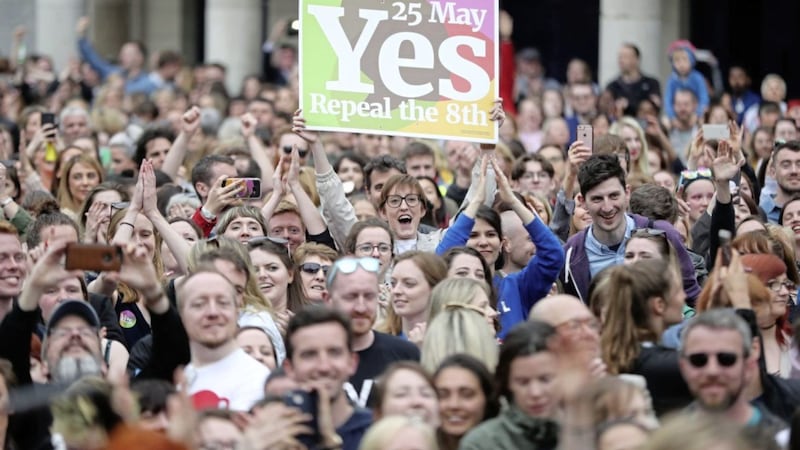At Dublin Castle on Saturday evening, one of Ireland’s retired Supreme Court judges, Catherine McGuinness, gave Sky News a pithy post-referendum comment about ‘resisting England’.
It was soon lifted on social media, where she was incongruously labelled as an “elderly lady”.
Belfast-born Judge McGuinness was previously chair of the Irish government’s Forum for Peace and Reconciliation in the mid-1990s.
The Forum gathered voices from across the island of Ireland before the Good Friday Agreement negotiations, focusing on inclusivity and dialogue – not predetermined outcomes.
It was coincidental that last week’s referendum on changing the 8th Amendment to the Irish Constitution fell almost 20 years to the day after the referendum that amended Articles 2 and 3 as part of the Good Friday Agreement.
Learned judges. Inclusive dialogue. Participative assemblies. Civic involvement. Constitutional changes. Popular votes. Political debates. Parliamentary laws. Judicial interpretations.
In weeks like this, the post-election passion of hard-fought, heartfelt issues – either won or lost – means we can lose sight of something fundamentally important about our society.
Namely this: we live on these islands, Ireland and Britain, within a highly credible democratic framework of the rule of law – in its fullest sense; an ambition of which the majority of other citizens on earth can only dream.
Of course it’s imperfect. And of course powerful influencers can use ‘time and big money’ to shape social directions, and sometimes outcomes. Some interests have significantly more power than individuals. However, the complacency of regular citizens is often as influential as conspiracies of self-interest.
But in relative terms, think about flying a few hours east of Dublin and trying to have a rational public debate about deeply held social viewpoints.
Will the rule of law will be applied fairly and fully in Moscow? Or could you be routinely locked up simply for disagreeing?
Or go west of Dublin for six hours and try for a reasoned approach in Washington to reforming the disastrous culture of racial profiling by police.
Is the rule of law being applied fully and fairly to young African-Americans? Is that why they’re being regularly killed without justification?
Or take a plane southward, and think about trying to discuss any major social issue with women as equal participants on public platforms in many parts of North Africa or the Middle East.
Can you even contemplate such cultural equality in somewhere like Saudi Arabia? A place where women are still being arrested for driving cars – today – four weeks before that country’s obscene anti-women driving ban is supposed to end?
As for Yemen, or Syria, or Palestine? What wouldn’t those citizens give for the rule of law that we have?
One of the understandable features of human life is our tendency to see every issue only from our own perspective. In Ireland, our parochialism can be both beneficial (at times of local need) and burdensome (at times of major flux).
But the rule of law as a foundation stone for our democratic society allows us to embrace the bigger idea that the legal policies arising from political, parliamentary and social debate are never fixed and permanent.
The open and transparent use of referenda, constitutions, state elections, parliamentary legislation, judicial review, and so forth, provide a compelling safeguard against maladministration, despotism, dictatorship, and ultimately fascism.
These mechanics of the rule of law have been central to the credibility of democratic reform within the state of Northern Ireland, notwithstanding the contested nature of constitutional sovereignty affecting Ireland nationally.
In the north, we have a judiciary – particularly in the High Court – which probably represents the most impressive reform of the past twenty years in terms of its reasoned judgments; the increasingly representative bench; an impressive attachment to purposiveness interpretations; and a new level of tangible humanity within many court proceedings.
And that’s why pessimism about local political stasis should be countered by optimism arising from the strength of the rule of law across this island.
We are increasingly seeing the rule of law in Ireland being reshaped by the mentalities of younger, non-aligned voters. But we must remember that the social mentality of any state, or nation, can be publicly reformed without any individual surrendering the integrity of their own personal, private morality.
This big idea provides the democratic basis for constantly considering every issue of social importance - from housing and homelessness, to economic inequality or constitutional sovereignty.
Someone even asked me last week whether we as a society can have a conversation - in the short-to-medium term - about remaining in the EU, respecting his Britishness and Irishness, without it becoming immediately about Irish unity?
The rule of law says that we can. We should have confidence in our democracy.








